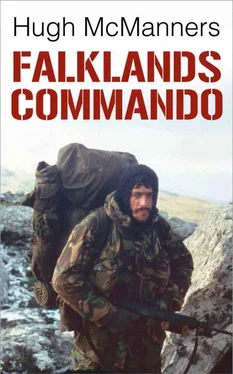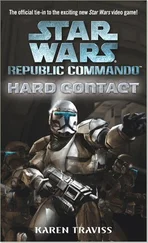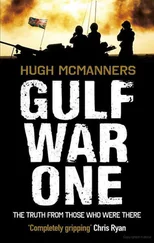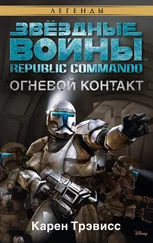Hugh McManners - Falklands Commando
Здесь есть возможность читать онлайн «Hugh McManners - Falklands Commando» весь текст электронной книги совершенно бесплатно (целиком полную версию без сокращений). В некоторых случаях можно слушать аудио, скачать через торрент в формате fb2 и присутствует краткое содержание. Город: London, Год выпуска: 2014, ISBN: 2014, Издательство: Nightstrike Publishing, Жанр: nonf_military, Биографии и Мемуары, на английском языке. Описание произведения, (предисловие) а так же отзывы посетителей доступны на портале библиотеки ЛибКат.
- Название:Falklands Commando
- Автор:
- Издательство:Nightstrike Publishing
- Жанр:
- Год:2014
- Город:London
- ISBN:978-0-992-81540-0
- Рейтинг книги:4 / 5. Голосов: 1
-
Избранное:Добавить в избранное
- Отзывы:
-
Ваша оценка:
- 80
- 1
- 2
- 3
- 4
- 5
Falklands Commando: краткое содержание, описание и аннотация
Предлагаем к чтению аннотацию, описание, краткое содержание или предисловие (зависит от того, что написал сам автор книги «Falklands Commando»). Если вы не нашли необходимую информацию о книге — напишите в комментариях, мы постараемся отыскать её.
Falklands Commando — читать онлайн бесплатно полную книгу (весь текст) целиком
Ниже представлен текст книги, разбитый по страницам. Система сохранения места последней прочитанной страницы, позволяет с удобством читать онлайн бесплатно книгу «Falklands Commando», без необходимости каждый раз заново искать на чём Вы остановились. Поставьте закладку, и сможете в любой момент перейти на страницу, на которой закончили чтение.
Интервал:
Закладка:
The attitudes of servicemen to battle stress, and the psychological effects of battle on combatants are understandably very sensitive matters. Everybody knows that war is bloody awful, but if you are a professional soldier, sailor or airman, there’s no point in dwelling on it. All military forces practise some kind of ‘machismo’ or ‘stiff upper lip’, which keeps them going in adversity, but can make them seem blind and insensitive. From the point of view of professional institutions like the Staff College, both Directing Staff and students know that wars have to be planned and fought. It’s their job. Ignoring unpleasant facts would be stupid, but equally, becoming obsessed with the dreadful horror of future battlefields is not the function of military men.
Military attitudes to this highly sensitive subject have evolved… Before the Falklands War, the Royal Navy in particular was oriented towards a peacetime existence: official trips to exotic ports, bands, flags, cocktail parties and bunting. In the Falklands, some naval personnel, finding themselves involved in a full-blown modern sea war, were taken by surprise. Service psychiatrists, particularly those from the Royal Navy, attempted to draw attention to the various post-Falklands problems of many veterans. Vietnam veterans had suffered similar problems, labelled as Post Traumatic Stress Disorder (PTSD). But in the early 1980s, few members of such a rational group of people as the Armed Forces had much time for psychiatrists, especially ‘shrinks in uniform’ pointing accusing fingers at the way fighting men plan and fight their wars.
In the often narrow-minded politics of Service life, minority points of view (and opposition to them) are often overstated in order to be heard, or are used as platforms to further the reputations of individuals. Views become polarised, then common sense evaporates. This process may unfortunately have confused the very important debate within the Armed Forces over combat stress and its long-term effects.
In their publicising of PTSD, military psychiatrists have a very important contribution to make towards the training of men for war, and their psychological care afterwards. However, I realised during this 1990 Staff College study period that the psychiatrists had (temporarily) lost their influence. PTSD had become a rather tedious subject, regarded with varying degrees of scorn or indifference – even as an indication of weakness of character. One lecturer even referred to PTSD as ‘Compensationitis’.
Most of the other combat veterans present at the study period had served in the Second World War. In syndicate discussions, several made very disparaging comments about combat stress, recounted ordering gibbering men to ‘pull themselves together’, even drawing their pistols as further encouragement. Their clear-cut response to battle stress problems was greeted with relieved laughter, the veterans seeming to have contradicted the psychiatrists’ depressing predictions. But actually these Second World War veterans did not want to discuss battle stress, and seemed happier telling war stories than answering the students’ questions. I came away with the strong feeling that we had been given sanitised versions of a very different reality.
Perhaps because the Second World War affected everyone in that generation, they rarely talked openly about it. There are a few Second World War autobiographies in which the unvarnished reality comes through, but many more are in the Boy’s Own Paper style, in which everybody seems to behave stereotypically. Forty years of telling abridged versions of war stories to children could have had something to do with it. We were always asking my father (a Second World War infantry officer) to ‘tell us a story from the war’. Only once did he let slip something unpleasant.
The Second World War also affected civilians. In the first three months of the Blitz, 12,696 Londoners were killed. When the worst of the bombing was over, in November alone, 4,558 were killed (in all of Britain) and thousands more injured. Civilians saw grotesque horrors equal to those of the Falklands or the Gulf, yet they appear to have learned to cope. After the war, ‘winning the peace’ was more important than dwelling on the past, and frank talk about the war was confined to old comrades reunions, many of which (participants’ health permitting) still flourish today. At the end of his excellent book 18 Platoon (published in 1987) Sydney Jary declares that he did not suffer ‘nervously or emotionally’ as a result of his battle experiences. He won an MC as a platoon commander in the Somerset Light Infantry, fighting from the Normandy landings in June 1944 until the end of the war in Bremen. However it is clear from the final pages of Jary’s book, that normal life was pallid and unsatisfactory to him afterwards, and that as a sensitive man and first-class soldier, he had been very deeply affected.
It could be that the enormous stress of the Second World War, a desperate struggle for freedom against a very tangible evil, affected that entire generation. Everyone was living in the fast lane of life; falling in love, marrying and parting within days, losing their children to unknown foster parents and their homes to the Luftwaffe.
We, who did not live through those years, think of the dead of that war as mere names on memorials, as the forgotten people who never completed their journey. We never knew them. We can only know the survivors of that war, and we base most of our impressions of it upon what they chose to tell us. In so doing, maybe we are forgetting the nature of their journey, and the significance of all those who died along the way? The MP Enoch Powell talked hauntingly of this. Many people lost all their friends in the war, and in their hearts wish that they too had died with them. War and youth were synonymous, and with the peace came a realisation that the one had taken the other forever. Perhaps an entire generation was burnt out by the emotional experiences of the Second World War, never fully to regain its zest and youthfulness? Such a suggestion would not be disputed in the Soviet Union where, despite the tribulations that followed the war against Hitler, war memories are sombre, with both respect and hatreds well-preserved.
But one must not generalise about the collective effects of individual trauma on nations: the Japanese reaction to defeat and the atomic destruction of two major cities made them the second most economically powerful nation in the world. Germany has succeeded in an equally miraculous way. In many ways, Britain paid for this…
There is however no doubt of the suffering of the war generation in Germany. Today they suffer doubly the shame of their children: for what happened, and also for joining and so tacitly supporting the moral degeneracy that allowed the worst of the Nazi excesses to take place. Some of that older generation have become stridently defensive, but most refuse to talk about it.
Humans are very tough and resourceful, solving most of their emotional and psychological problems without professional help. The most common self-therapies for PTSD are hard work to keep the memories at bay, and drugs (usually alcohol) to induce sleep at night. Today, psychiatrists have discovered that the suppressed emotions of the war generation are giving way to a very delayed PTSD, forty years on. As the young men who survived the Second World War retired, entered old age and lost their spouses, for the first time since the war they found themselves with time to spare. Many Second World War, Korea and older veterans of more recent wars are seeking medical help with PTSD problems, as their memories catch up with them.
Members of the ‘stiff upper lip brigade’ are still among us, but within the military, combat experience has greatly lessened the numbers. Combat veterans know that ‘but for the grace of God’ applies, and know personally the feeling of cowardice.
Читать дальшеИнтервал:
Закладка:
Похожие книги на «Falklands Commando»
Представляем Вашему вниманию похожие книги на «Falklands Commando» списком для выбора. Мы отобрали схожую по названию и смыслу литературу в надежде предоставить читателям больше вариантов отыскать новые, интересные, ещё непрочитанные произведения.
Обсуждение, отзывы о книге «Falklands Commando» и просто собственные мнения читателей. Оставьте ваши комментарии, напишите, что Вы думаете о произведении, его смысле или главных героях. Укажите что конкретно понравилось, а что нет, и почему Вы так считаете.












